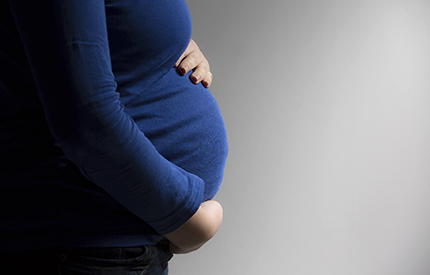Prenatal depression unlikely to affect unborn babies

Depression during pregnancy is unlikely to directly impact babies in the womb and lead to emotional or behavioural problems after birth, according to a new study by King’s College London researchers published in The Lancet Psychiatry.
Up to 1 in 5 expectant mothers will experience depression during pregnancy, with such episodes being associated with the development of emotional and behavioural problems in childhood. Previously, scientists had interpreted this association as potentially comprising a ‘foetal programming’ effect, whereby exposure to prenatal depression in the womb has a direct effect on the developing foetus, ultimately causing the development of problems later in childhood.
However, the study from researchers at the Institute of Psychiatry, Psychology & Neuroscience (IoPPN) at King’s College London, the University of Glasgow, the University of Oslo, and the Norwegian Institute of Public Health, revisited this association while accounting for two important issues not previously considered. Firstly, mother and child are genetically related, so associations may be caused by the transmission of genes associated with emotional problems; and secondly, mothers who experience prenatal depression are likely to experience depression as children are growing up, so associations may be attributable to exposure to maternal depression in childhood.
The researchers analysed a Norwegian sample of 22,195 mothers with 35,299 children, in which many mothers were related to one another in different ways (identical twins, non-identical twins, sisters, half-sisters) as were the children (twins, siblings, half-siblings, cousins, half-cousins). They used this information to identify how important genetic transmission was in explaining associations, finding that the association between prenatal depression and child behaviour problems could be entirely explained by genetic transmission. The association with child emotional problems was explained by the combination of genetic transmission and exposure to maternal depressive symptoms in childhood. Crucially, this suggests that prenatal depressive symptoms in mothers do not play a major role in the development of emotional and behavioural problems in children.
Senior author on the study, Dr Tom McAdams from the IoPPN, added, ‘Women who experience depression during their pregnancy often fear that their depression will have a detrimental effects on their developing child. This study should be welcome news as it suggests that prenatal depression is unlikely to have a long-lasting negative effect on their child’s emotional and behavioural development.’
Lead author, Dr Laurie Hannigan from the University of Glasgow, added, ‘We are better able to identify environmental risk mechanisms when we also account for genetic ones. Doing so in this study, we find that the link between maternal prenatal depression and offspring emotional and behavioural development is primarily genetic in nature. This means that – unlike, for example, the links between prenatal smoking or alcohol use and birthweight – depression in pregnancy appears not to have direct effects on the developing foetus that manifest as emotional and behavioural problems later down the line. It is also, however, crucial to note that these results in no way minimise the importance of women who experience depression during pregnancy receiving appropriate care and support.’
Paper reference
'Maternal prenatal depressive symptoms and risk for early-life psychopathology in offspring: genetic analyses in the Norwegian Mother and Child Birth Cohort Study', Hannigan et al, The Lancet Psychiatry, DOI: 10.1016/S2215-0366(18)30225-6
Contact
For further media information please contact: Robin Bisson, Senior Press Officer, Institute of Psychiatry, Psychology & Neuroscience, King’s College London, robin.bisson@kcl.ac.uk / +44 20 7848 5377 / +44 7718 697176.